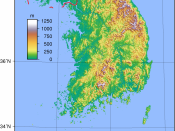However unfair it may seem to some, the rich and the poor have always coexisted and still can be found among various societies as well as countries. People from some countries enjoy the luxuries and maintain certain level of lifestyle that only wealth can provide while those from other countries lack even the basic needs of existence such as nutrition. One can witness some situations where rich countries offer to help poor countries with various methods, and it appears to be giving and generous. However, countries do not just throw out their capital with which they themselves can use for their own benefit. The immediate result of help can produce wealth in poor countries while not affecting rich countries much, but the true incentive behind the help of rich countries lie deeper in the aspect of economics and politics.
Dependency theory assumes that the low levels of development have occurred in less economically developed countries because they have relied and depended on more economically developed countries; therefore, third-world poverty is the consequence and the fault of the Northern world's wealth.
To be more specific, the poverty of low-income countries stems from their exploitation by wealthy countries. The differences in the quality of life can be observed in individuals of those countries. For example, people in high-income countries are far healthier than those of low-income countries whose sources of poor health can be attributed to hunger, malnutrition and famine; people in high-income countries obtain a higher level of education and literacy and more.
The advocates of dependency theory claim that less economically developed countries will remain less developed because their surplus products are restricted and taken advantage by multinational corporations of more economically developed countries; however, other countries, such as Taiwan and South Korea, exist to contradict this conjecture. More deeply...


